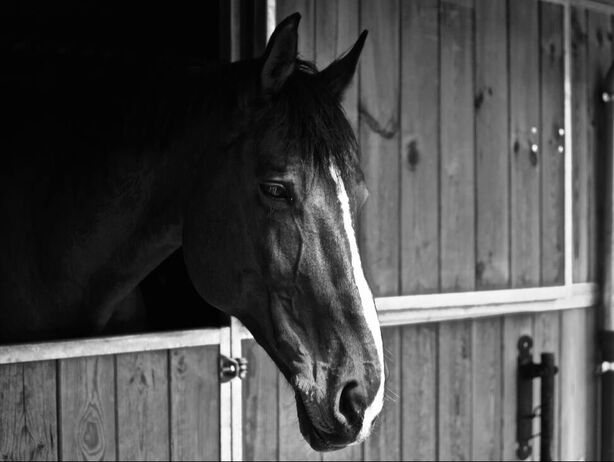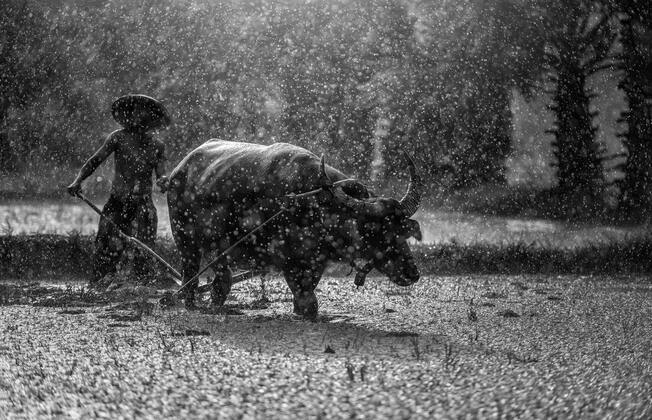|
One morning, a woman gathering herbs saw an injured bird. She carefully picked it up and took it home. Her father made a box for the bird. Her blind mother tucked soft cloth into the box. Her husband brought food for the bird. The woman gave it water to drink.
In time, the bird gained strength and its injury healed. There came a day when the woman opened the door and the bird flew out. She was happy to see the bird fly yet missed its cheerful chirping. The next morning, when the woman walked outside, the bird flew on to her shoulder and said, “Because you cared for me, I grant you one wish.” The woman thanked the bird but wasn’t sure what to ask for. “May I have a day to think about it.” “I will come to you tomorrow. Be prepared to tell me what you wish for.” That night, the woman told her mother, father, and husband about the gift of a wish from the bird. Her father said, “Wish for gold.” Her mother said, “Wish for my eyesight to be restored.” The husband said, “We have been yearning to have a child. Wish for a child.” In the morning, as the woman worked in her garden, the bird flew on to her shoulder and asked, “Have you decided what to wish for?” “Yes,” said the woman. “I wish for my mother to see her grandchild lying in a golden cradle.” The bird said, “So it shall be.” And it was.
0 Comments
The village was suffering from a devastating plague. None of the people’s prayers, rituals, or medicines was powerful enough to stop the illness. A young man, Nekumonta, having watched helplessly as loved ones died, now saw his wife struggle to breathe. He knew her only chance to survive lay in his finding the water that nourished the healing herbs the Great Manitou had planted. He left on a cold morning, walking as fast as he could, taking no time to eat or drink. Every time he encountered an animal he asked, “Can you tell me where to find the water nourished by the healing herbs planted by the Great Manitou.” Each animal reluctantly said no. Three days and nights passed. Too tired to go any further he lay down on the frozen earth. While he slept, animals gathered around him, warming him with their breaths, remembering how kind he’d been to them. They begged the Great Manitou to help him. As Nekumonta slept he dreamed his wife was alive, singing a sweet song that sounded like water falling. When he woke, he continued to hear the sound and looked everywhere but could find no water. Suddenly he realized the sound was coming from beneath him. Digging frantically with a strong branch, he uncovered a spring. He jumped into the hole he’d dug and soon felt refreshed and energized after bathing in the water. He made a small jar out of clay and baked it in the fire until it was hard enough to hold the healing water. Moving as fast as he could, without spilling any of the precious water, he arrived to find his wife barely breathing. Dipping his finger into the water, he wet her lips, then washed her face until she fell into a peaceful sleep. When she awoke she had fully recovered. Other members of Nekumonta’s tribe followed in his footsteps, bringing back the healing water, eventually riding the village of the plague. For the rest of his life, Nekumonta was known as the Chief of the Healing Water. August 2023 Stories (click to read)
Catherine was a lovely, intelligent, kind, gentle young woman, with wealthy parents and an adoring fiancé, living in a beautiful mansion surrounded by gardens, one of which she regarded as her special place. When she saw the strange woman she asked, “Who are you? What are you doing in my garden?” The woman did not move or speak. Catherine said, “Please, go. Now!”
There was a fraught silence before the strange woman said, “I am your Fate. It is your time of choosing—whether to be happy when young and unhappy when old, or unhappy when young and happy when old. Do not say you will not choose, for if you do not, I will choose for you. Decide now!” Catherine wished she were dreaming, knowing she was not. “Wrinkles and age make poor companions. I choose to be unhappy when I am young and happy when I am old.” With that, there was a fierce wind. The strange woman disappeared. Catherine was alone. All she’d known was gone. She decided to walk until she came to a town where she might find work that would give her a place to stay and food to eat. When she passed a house and saw a woman looking out the window, Catherine told her she was looking for work. The woman replied, “I have need of a servant. I think you will do well. Come in.” Catherine learned quickly and the woman became fond of her, each day trusting her more. One day, she told Catherine she had to leave for a few hours, to take good care of the house. Once the woman left Fate appeared. “So, Catherine, did you think you could escape me?” With that, Fate began to wreck the house. Catherine was horrified and begged Fate to stop. “My mistress will be furious. Please, go.” When Fate refused to stop, Catherine gathered her few belongings and fled. Unbeknownst to her, as soon as Catherine had gone, Fate restored order and left. So it was for seven years. Every time Catherine found a place to live and work, Fate followed her, destroying the interior, forcing her to leave. In time, Catherine traveled to a city far from where she’d ever been. Tired, hungry, and discouraged, she walked by a house where a woman was watering flowers. “Please, Ma’am, might you be so kind as to give me something to eat and a place to rest. I am willing to work.” “You have come at the right time. I will feed and give you lodgings, but every morning you must climb the mountain with bread and cheese and leave it in front of the cave at the top.” After a few days, surprised that Fate had not appeared, Catherine worked up her courage to ask about the strange task. The woman said, “I must feed my Fate to keep her content. I cannot bear to think what she might do were I to stop.” When Catherine heard this she began to weep. She told the woman how she had spent the last seven years, how she had lost everything. The woman said, “Do not despair. When you go up to the mountain in the morning with my Fate’s bread and cheese, ask her to have a word with your Fate. Perhaps she can help.” The next morning, after giving the woman’s Fate the food, Catherine asked if she might help her make peace with her Fate. “Your Fate is sleeping. I will not wake her. Tomorrow, when you come with my bread and cheese, bring her a gift. If she is pleased, she will give you something. Thank her graciously and leave.” Before climbing the mountain at dawn, Catherine made a bouquet of flowers to give to her Fate. After her mistress’s Fate received the bread and cheese, she took Catherine to her Fate and asked her to stop tormenting Catherine. An arm appeared, took the bouquet, gave Catherine a skein of purple thread, then disappeared. Puzzled, Catherine showed her mistress the curious gift. She told Catherine, “Keep it safe. There might come a time when it will be of use.” Sometime later, the king of the country discovered his royal robe had ripped. None of the country’s tailors had the right color thread. “Issue a proclamation,” he ordered. “Whoever has silk of this color must bring it to the court.” That afternoon, Catherine went to the palace. She showed the skein of purple silk to the guards who immediately took her to the king. He thanked her for the silk and put it on one side of a scale. On the other side, his advisor placed gold, but no matter how much gold he put on the scale, the skein weighed more. Exasperated, the king placed his crown on the scale and the scales balanced. ‘Who are you?” he asked. Catherine told the king about her meeting with Fate and what had happened since. “It is clear,” he said, “Fate has brought us together.” As was the custom, they married. For the rest of her life, Catherine continued to bring gifts to her Fate. There was once a water bearer who carried two pots of water on opposite ends of a long pole across the back of his neck. One pot was perfect, the other had a small crack. By the end of the water bearer’s trip, the pot with the crack had lost half of its water. The perfect pot sneered at the cracked pot. “The poor man works so hard to fill you up and then you can’t even keep all the water inside you. Drip. Drip. Drip.” The cracked pot felt terrible. One day it said to the man, “I am so sorry. Because of me you lose much of your hard work. I am filled with shame.” “Why?” asked the water bearer?” “There is a small crack in my side and water slowly drips out. By the time you reach the end of your journey I am only half-filled. You do not get the full value of your hard work.” The water bearer felt sorry that the cracked pot was suffering so badly. “There is no need for shame. You do what the perfect pot cannot do.” The cracked pot was incredulous. “How can this be? I do not understand.” The water bearer smiled and said, “As we walk, look to your left and then to your right. Tell me what you see.” The cracked pot thought this was ridiculous. How was looking going to erase shame? But it did what the water bearer said. “To the left there was nothing. To the right there was a lovely row of flowers lining the path on which the water bearer walked. “What do you see,” asked the water bearer. “I see a row of flowers lining the path on the right. What does that have to do with me?” “When I saw that water dripped from you, I planted seeds along the path. The water that drips from you, waters the seeds. Now there are lovely flowers along the side of the path. Had you no crack there would be no flowers.” June 2023 Stories
In a small town in India, a bunch of thieves had terrorized everyone. It was so bad they would tell people which house would be raided that night. If people tried to hide their valuables or call the police, they suffered dire consequences.
One day, Bapurao, a rich man received word that his house would be raided and was given the usual warning. Shaking with fear, he told his wife Parvatibai about the thieves’ plan. He said he would gather their servants and arm them so they could fight back. His wife shook her head. “Many people have tried this and no one has succeeded. We need to think of a way to outwit the thieves. “What can we do?” asked her husband. When she told him she needed to think about it, he left to collect as many men from the village as would join him. When her husband had gone, she went into the kitchen and said to the cook, “Prepare the best meal you can make for fifty people. Then set the tables with our best dishes and finest tableware. I need everything to be ready by midnight.” Just before midnight, she dressed in her most beautiful sari and took off all her jewels except her wedding ring and the necklace her husband had given her in honor of their marriage. When she heard the noise of horses hoofs she opened the door, terrified but calm. Before her stood many men, ready to storm in. Without waiting, Parvatibai said, “Welcome brothers, please come in. I have been waiting for you. Please wash your hands. Dinner is ready. The head thief wondered if it was a trick, but he could smell the food and saw that the woman welcoming him was calm and unafraid. When they were all seated, the servants attended to each man as Parvatibai made sure they all had enough to eat and drink. After dinner, she brought the head thief a dish filled with jewels and placed them before him. “Brother, this is what I have to give you. I have kept back only the necklace my husband gave me when we married and my wedding ring. Please, I beg of you, let me keep them.” The head thief looked at her, then said, “Of course I will spare them. We have eaten your meal and we are always faithful to those with whom we share food. You have called me brother and given me a brother’s welcome. From today you are my sister and I will see to it that you and your family come to no harm.” He returned the jewels and ordered his men to free her husband, their servants, and the men who had come to help and bring them back to the house unharmed. Even today, people talk about how Parvatibai outwitted the thieves. Great Spirit gathered all the Animal People together to tell them that New People were coming. All the Animal People were going to have names that would be theirs forever, handed down to future generations. The Animal People were told to come to Great Spirit’s lodge the next morning at dawn and each in turn would receive their names. First come, first served. Coyote hated his name. He didn’t want to be known as Trickster or Imitator. He wanted a great name that the Animal People would respect and honor. He would ask to be called Grizzly Bear for his strength. If that name was taken, he would ask to be called Eagle, for his swiftness. If that name was taken, he would ask to be called Salmon, the powerful swimmer. Satisfied with his plan, he stayed awake all night, putting twigs in his eyes to keep them from closing. He intended to be first so he could have the name he chose. The next morning, he was pleased to see no one was around. Surely he was first to appear before Great Spirit. Joyfully he asked to be called Grizzly Bear. Great Spirit spoke, “Grizzly Bear was already here. He has taken his name. “Oh,” said Coyote, delighted he had a strategy. “Then I will be Eagle.” “Eagle has come and gone. He has taken his name,” said Great Spirit. “Then I will be Salmon,” responded Coyote. “That is impossible. Salmon has taken his name,” said Great Sprit. Coyote was too upset to think of another name. “What name has not been taken?” he asked Great Spirit. “All the Animal People have come and gone. You are the last to appear before me. No one wanted your name.” Coyote looked so miserable, Great Spirit said, “I made you sleep so you would be last to come. I need you to be who you are, Coyote.” “But I don’t want to be who I am. I want a new name.” “I need you to keep your name. I need you to be who you are. I have important work for you to do. The New People who are coming do not know anything. You know how to laugh and cry. You are brave and cowardly, wise and foolish, hard-hearted and kind. I need you to teach the New People how to be fully human, for that is who they are, human beings.” Coyote was not convinced. “But if I am foolish, they will laugh at me. When I am cowardly, they will not respect me. How can I teach them?” Great Spirit reassured him. “When you are foolish and wise, cowardly and brave, mean-spirited and kind, they will understand that no one is always foolish, always brave, always uncaring. You will see them through bad and good times. To help you do your work, I give you special gifts. You can change into any shape you choose. You can understand and talk to all who speak to you. If you die, you will be reborn. Shapechanger, go and do your work. You will do it well.” Coyote felt his heavy spirit lighten and his heart fill with joy as he went out into the world to meet the New People, ready to do the work of Great Spirit. There was once a wise man who went to a house of learning to offer his wisdom. He expected many people to attend, but no matter how long he waited, only one person showed up. The wise man was thinking of leaving but, being polite, he asked the man, “You are the only person here, should I leave and return another time, when more people might attend?”
“Sir, I am not a wise man like you, but if I entered a stable and there was only one horse there, I would still feed it.” The wise man nodded and began to speak at great length. When he paused to take a drink, he asked, “Shall I continue?” “Sir, I am not a wise man like you, but if I entered the stable and discovered there was only one horse, I would not feed it all the grain in the stable. There was once a poor man who cut and sold wood in order to earn a living but no matter how hard he worked he never made enough money to buy all the food his family needed. Day after day, watching his children grow pale and thin, he became so discouraged he decided to end his life.
He went to a cave where he knew a lion lived and stood outside of it. “Lion, please come eat me.” The lion, amazed at the request, asked, “Why do you ask such a thing of me?” The man told him of his plight and added, “If I die, perhaps my wife will find a new husband who can take better care of her and the children.” The lion listened, then said, “If it is only money that keeps you from wanting to live, take this gold coin.” He threw the man more money than he saw in a year. Thanking him, the woodcutter rushed to the market and bought as much food for his family in one day as he’d been able to buy in a month. Though his wife was careful, eventually they spent all the money. Once again there was not enough food to feed the family. Once again, the woodcutter went to the lion, begging him to eat him. Once again, the lion threw him a gold coin. In time, the man’s wife said, “The lion has been so good to us. I think we should invite him to dinner to show him how grateful we are.” The man was not so sure. “He’s a lion. We don’t know what he likes to eat. Perhaps we should think of another way to thank him.” But his wife persuaded him. The next day the woodcutter went to the lion. “My wife and I would be very pleased if you would come to our home for dinner.” “Thank you. I shall be delighted,” said the lion with such joy the man forgot his misgivings. The next day his wife spent all day preparing the most delicious meal she knew how to cook. The children cleaned the house. The man chopped enough wood to make a splendid fire. At the appointed time, the lion knocked on the door and was ushered in by the family who kept telling him how grateful they were for his help. The meal was a great success and the man began to relax thinking how good it was his wife had thought to invite the lion. As the husband was showing the lion to the door, he overheard someone say, “He’s a very nice lion but he doesn’t smell very good.” Shocked, the man hoped the lion had not heard. When the lion did not react, the man sighed with relief. Outside, the lion said to the man, “Tomorrow, come to see me. Please bring your sharpest knife. I have a favor to ask of you.” “With pleasure,” said the man. “After all you have done for me and my family, I am happy to help you.” The next morning the woodcutter stood in front of the cave waiting for the lion. This time, after the lion gave him a gold coin he said to the man, “I want you to take your knife and slash my face to ribbons.” The woodcutter recoiled in horror. “I can’t do that. You’ve been so good to me and my family. Why would I want to hurt you?” “You promised you would do as I requested,” reminded the lion. “Are you going to go back on your word?” With a heavy heart, the man slashed the lion’s face until his face was a bloody mess. “Now, leave me,” said the lion. “Return in two weeks.” When the man returned the lion said to him, “My head heals. My heart still hurts.” In former times, the Akha had letters that contained all the wisdom of the tribe, but one year, they were swallowed by the water buffalo. The Akha moved every year and when it came to move, the water buffalo's skin was too big and too heavy for the people to move. They were perplexed. Although they did not want to leave their letters and their wisdom, they could not find a way to move the weighty skin.
They went to the Head Man. He thought about the problem and then spoke. "If we cannot move the water buffalo's skin, we must eat the water buffalo's skin. This way, we will keep the letters and our wisdom inside us, forever." And so, the water buffalo's skin was cut up into the number of people in the group. Each person swallowed a piece. Thus was wisdom kept within the tribe forever. There was once a man who lived in a small village far away from the nearest big city. He and his wife worked hard but they often went to bed hungry in order to feed their children. One night, he woke his wife and said, “I have had the most marvelous dream. I want to tell you what it was so I don’t forget it.”
His wife said, “I have never known you to have such a dream, tell me. I am listening.” “I dreamt that I went to the city and walked to a bridge spanning a wide river. Next to the bridge, guarded by a soldier, was a little hill and at the bottom of the hill, buried deep, was a bag of gold.” Neither he nor his wife knew what to make of the dream, but after he dreamed it for a third time, they decided he should go to the city. Maybe there was gold buried beside the bridge. The couple saved and scrimped until the man had enough food to walk the long distance to the city. When he arrived, tired and dirty, he saw the soldier guarding the bridge. It was all as he had seen in his dream. As he approached the side of the bridge, the soldier came up to him and said, “I have to tell someone about my amazing dream.” When the man nodded, the soldier began. “I dreamt I walked a far distance to a small village where there is a large tree shading a small house. Tangled in the roots is a bag of gold.” The more the soldier described the village, the more astounded the man was. It seemed the soldier was describing his village, the tree beside his little house. The soldier sighed. “If only I could get leave, I’d go to that village. I’d dig up the gold and no one but me would know.” The soldier seemed to be so sure the gold was in the small village, near the house, sounding exactly like where the man lived, that the man, who was afraid of the soldier, decided to go home without digging near the bridge. When he arrived home, he told his wife about the soldier’s dream. Together, toward dusk, when no could see them, the couple dug carefully around the tree’s roots. And there, before their incredulous eyes, was the bag of gold. |
World TalesAge old stories of wit and wisdom from around the world. Tales retold by Nancy King. Archives
July 2024
Categories |
Copyright © Nancy King 2020 | Site Design by Angulo Marketing & Design
|
|
Nancy King is a widely published author and a professor emerita at the University of Delaware, where she has taught theater, drama, playwriting, creative writing, and multidisciplinary studies with an emphasis on world literature. She has published seven previous works of nonfiction and five novels. Her new memoir, Breaking the Silence, explores the power of stories in healing from trauma and abuse. Her career has emphasized the use of her own experience in being silenced to encourage students to find their voices and to express their thoughts, feelings, and experiences with authenticity, as a way to add meaning to their lives.
|











 RSS Feed
RSS Feed